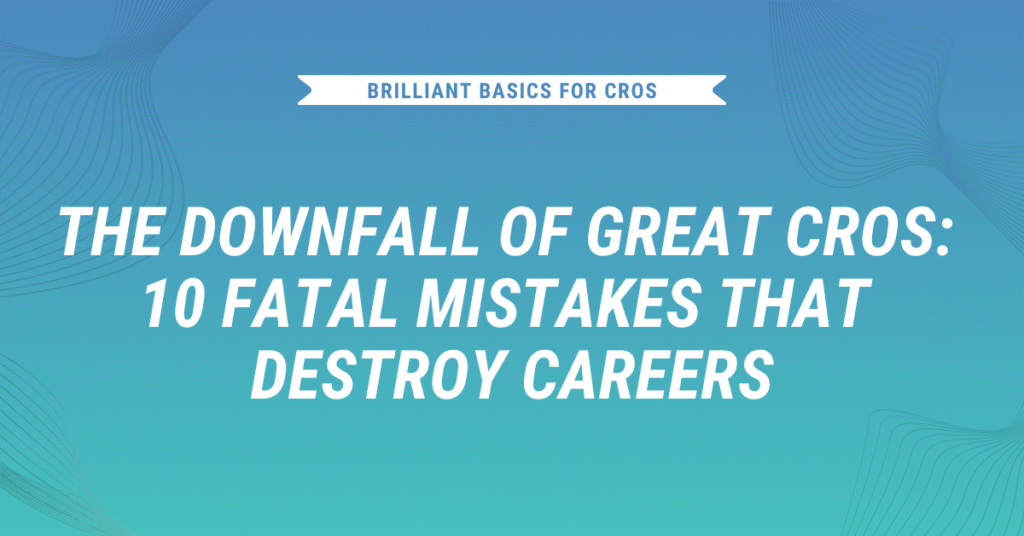The Downfall of Great CROs: 10 Fatal Mistakes That Destroy Careers
Last week I hosted my monthly webinar: “The Downfall of Great CROs – 10 Fatal Mistakes That Destroy Careers.”
A little negative? Maybe. But I wanted to bring together the most common blind spots I’ve seen again and again in mentoring CROs and working across a range of private equity B2B portfolio companies. It’s uncanny how often these mistakes repeat, regardless of industry, geography, or size.
Here’s a teaser of the 10 mistakes. For the full breakdown — including key symptoms to look for and practical steps to avoid them — watch the replay HERE. What mistakes would you add to the list?
1. No Formal Vision
If you don’t know where you’re going, chances are… you’ll still end up there.
People across the organisation — regardless of internal boundaries — need to understand what they’re working towards and believe in the “why.” If they don’t, they’ll invent their own priorities, and that’s when the chaos starts.
2. Lack of Ambition
I see CROs playing it safe in their role and when preparing for exits. I’m not talking about gung-ho bravado, but credible ambition. The mistake is failing to ask: “What would it take to blow the doors off?”
Too many CROs fall into the trap of building plans around historical trends or current budget constraints, rather than true market potential.
3. Lack of Focus
I’ve been there myself — spinning too many plates, chasing too many exciting ideas. It feels energising… but it leads to dilution and a lack of execution. Focus wins. Spread too thin and you won’t win anything.
4. Lack of Urgency
Urgency isn’t about moving fast or looking busy. I’ve seen plenty of ‘busy fools’: bouncing from meeting to meeting, making long to-do lists, talking quickly, building PowerPoints…
Real urgency is inner determination – a controlled sense of pressure. Great CROs act with purpose and conviction. They create a culture of focused urgency around them.
5. Failure to Optimise Skills & Resources
According to Salesforce’s State of Sales report, salespeople only spend 28% of their week actually selling. Meanwhile, 85% of leaders say they’re struggling to get budget for headcount.
Three common mistakes:
- Hiring the wrong people
- Scaling too fast
- Letting teams waste time on non-customer-facing work
Your team is your most expensive — and most valuable — asset. It’s your job to ensure they’re focused, skilled, and motivated.
6. Failure to Unify Teams
This one’s a killer. And yes, we’ve covered it in-depth in recent webinars and newsletters.
Sales blames Marketing for bad leads. Marketing blames Product for weak propositions. Customer Success blames Marketing for poor communication… and round it goes.
Fragmented teams stall growth. Full stop. CROs who ignore this won’t last long.
7. Failure to Safeguard Existing Customers
We’ve all heard the stat: acquiring a new customer costs 7–10x more than retaining an existing one.
Yet many CROs I meet are laser-focused on chasing new logos, only to be blindsided by churn from their most valuable customers.
Customer retention is a discipline, not a side effect. The best CROs have a clear strategy, data, and control mechanisms to protect and grow existing relationships.
8. Finger’s Not on the Pulse
CROs juggle a dozen pressures. They operate in complex, ever-changing environments — yet they’re expected to deliver predictable, sustainable growth.
Control is essential. Without a clear framework that delivers visibility, alignment, and influence, you’re leading blind. And no, being copied into every email thread doesn’t count.
9. Failure to Cease Initiatives & Activities
Every organisation is full of well-meaning ideas. But how many have clear goals? Resourcing? Owners?
Warren Buffett said it best:
“The difference between successful people and really successful people is that really successful people say no to almost everything.”
Failure to kill off non-essential projects wastes time, drains energy, and frustrates employees. You can’t focus if you don’t prune.
10. Inability to Control Stakeholders
CROs who can’t manage investor and internal expectations rarely last.
Control — and the perception of control — saves careers.
I often use this analogy: Your CEO is a passenger in your car. Do they feel safe? Sure, you might take a few detours… but do they believe you’ll reach the destination on time?
Failing to manage this perception leads to distraction, scrutiny, micro-management… and eventually, a crisis of confidence.
🎥 Missed the Webinar? Watch the Replay
The Downfall of Great CROs – 10 Fatal Mistakes That Destroy Careers 👉 Click here to watch the replay

📅 Next Live Webinar – Thursday 17th July at 16:00 (UK time)
Back by popular demand! “The 90 Day Plan for CROs – The Catalyst for Accelerating Revenue Growth”
💡 Who should join?
✅ New CROs looking to establish credibility and gain control, fast
✅ Experienced CROs under pressure to transform performance and needing a fresh catalyst
Save your seat now 👉 optilium.co.uk/webinar
Enjoy this newsletter? Subscribe to the newsletter via LinkedIn, repost to your network or learn more about me, Alan Crowther, and Optilium here.


